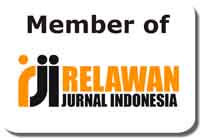Instructors' Reflection on Positive Behavior Support in RULES Foundation's EFL Classroom
Abstract
Students’ challenging behavior becomes one of the big issues in education nowadays and language education is not an exception. Therefore, preparing teachers insight towards the issue is essential as the first step to prevent the issue grows in the future. Positive Behavior Support appears as one of the solutions to this issue in developing countries such as Australia and Singapore in 2011. Supporting this system, the researcher perceived that it is vital to apply this system in the EFL classroom in Indonesia. This paper aims to investigate the instructors’ Reflection using Positive Behavior Support (PBS) in EFL classroom. The research used qualitative study and involved 3 instructors in an institution which applies EFL teaching as the program, also conducted an interview after the workshop and teaching to find more detail information in the data obtained. The finding of the study indicated that PBS in form of workshop positively supported the instructors’ teaching application when they were experiencing real teaching class situation using the support system. The instructors also perceived that having PBS workshop added their knowledge to support students’ behavior in their classroom and in the future positively. Unfortunately, two instructors denoted that they could not apply all the PBS parts in their teaching application since most of the students are adult learners. However, the instructors reported that through the workshop and teaching period they perceived a change in students’ positive behavior and PBS changes their paradigm toward teaching management system.
Keywords
Full Text:
PDFReferences
Alberth, Mursalim, Siam, I Ketut, S., & La, I. (2018). SOCIAL MEDIA AS A CONDUIT FOR TEACHER PROFESSIONAL DEVELOPMENT IN THE DIGITAL ERA: MYTHS, PROMISES OR REALITIES? TEFLIN, 29, 3.
Arbuckle, C. L., Emma. (2004). Teachers' Perception and Management of Disruptive Classroom Behavior During the Middle Years (years five to nine). Australian Journal of Education & Developmental Psychology, 4, 59-70.
Denne, L.D., Noone, S.J. Gore, N.J., Toogood, S., Hughes, C.J., Hastings, R.P., Allen, D., Baker, P., & McGill, P. (2013). Developing a core competencies framework for Positive Behaviour Support: Issues and recommendations. International Journal of Positive Behavioural Support 3 (2) 24-31.
Finlay, L. (2008). Reflecting on 'Reflective Practice'. Practice-Based Professional Learning Centre, 52.
Indayani, A. S., Gede; Antari, N, N, M. (2014). Penerapan Konseling Behavioral Dengan Tekhnik Penguatan Positif Sebagai Upaya Untuk Meminimalisasi Prilaku Membolos Pada Siswa Kelas X.1 SMA Negeri Sawan Tahun Ajaran 2013/2014. e-journal Undiksa Jurusan Bimbingan Konseling, 2(1).
Johansen, A. L., S, G; Akin-Little, Angeleque. (2011). An Examination of New Zealand Teachers' Attributions and Perceptions of Behavior, Classroom Management, and the Level of Formal Teacher Training Received in Behavior Management. KAIRARANGA, 12(2).
Main, S. H., Lorraine. (2008). Best Practice or Most Practiced? Pre-service Teachers' Beliefs about Effective Behavior Management Strategies and Reported Self-efficacy. Australian Journal of Education, 33(4).
Mcintosh, K. B., J, L; Price, Kathy. (2011). Evaluation of Social and Academic Effects of School-wide Positive Behavior Support in a Canadian School District. Exceptionally Education International, 21(1).
Moon, J. (2005). Guide For Busy Academics No. 4: Learning Through reflection. The Higher Education Academy.
O'Neill, C., Sue; Stephenson Jenifer. (2011). Classroom behavior management preparation in undergraduate primary teacher education in Australia: A web-based investigation. Australian Journal of Teacher Education, 36(10).
Ruef, M., B; Higgins, Cindy; Glaeser, B, J, C; Patnode, Marianne. (1998). Positive Behavioral Support: Strategies for Teachers. Intervention in School and Clinic, 34(1).
Safran, S., P; Oswal, Karen. (2003). Positive Behavior Supports: Can School Reshape Disciplinary Practices? Exceptional Children, 69(3).
Savage, C. L., Juliet; Colles, Nigel. (2011). Essentials for Implementation; Sic years of School-Wide Positive Behavior Support in New Zealand. New Zealand Journal of Psychology, 40(1).
Schon, W., V. (2010). Design as a Reflective Practice. Art + Design & Psychology, 2(2).
Simonsen, B., Sugai, G., & Negron, M. (2008). Schoolwide Positive Behavior Supports Primary Systems and Practices. Teaching Exceptional Children, 40(6).
Sugai, G. H., R, H; Dunlap, Glen; Hieneman, Meme; Lewis, T, J; Nelson, C, M; Scott, Terrance; Liaupsin, Carl. (1999). Applying Positive Behavioral Support and Functional Behavioral Assessment in School. Retrieved. from.
Sugai, G. H., Robert. (2002). The Evolution of Discipline Practices: School-Wide Postive Behavior Support. Child and Family Behavior Therapy, 24(1-2).
Walker, H., M; Horner, R, H; Sugai, George; Bullis, Michael; Sprague, J, R; Bricker, Diane; Kaufman, M, J. (1996). Integrated Approaches to Preventing Antisocial behavior Among School-Age Children and Youth. Journal of Emotional and Behavioral Disorders, 4(4).
Wilkerson, C. (2008). Instructors’Use of English in the Modern Language Classroom. Foreign Language Annals, 40(2).
Yeung, A., Y; Mooney, Mary; Barker, Katrina; Dobia, Brenda. (2009). Does School-wide Positive Behavior System Improve Learning in Primary schools? Some Preliminary Findings. New Horizons in Education, 57(1).
DOI: http://dx.doi.org/10.31332/lkw.v5i1.1228
Copyright (c) 2019 Muhammad Kurniawan Rachman

This work is licensed under a Creative Commons Attribution-ShareAlike 4.0 International License.
Langkawi: Journal of The Association for Arabic and English indexed by:


















.png)
.png)

.png)
2.png)








